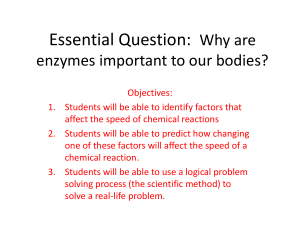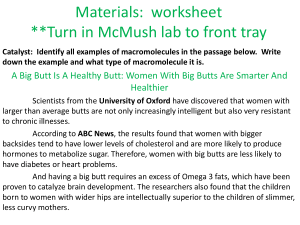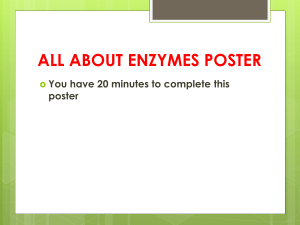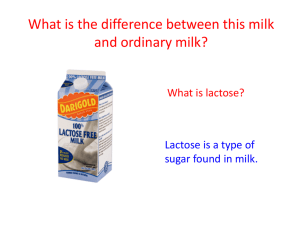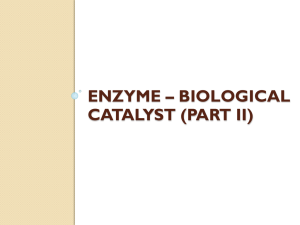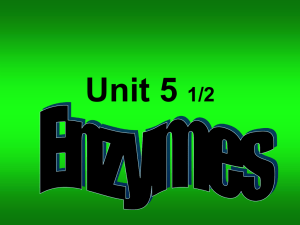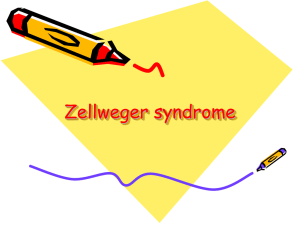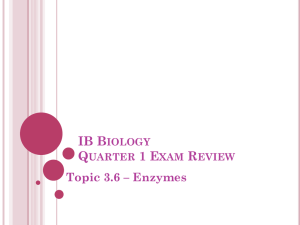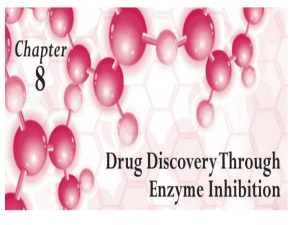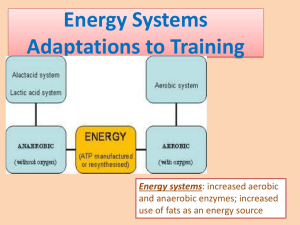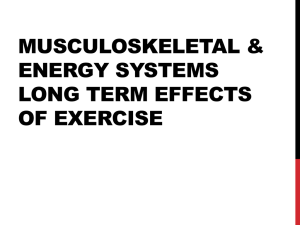Enzymes
advertisement
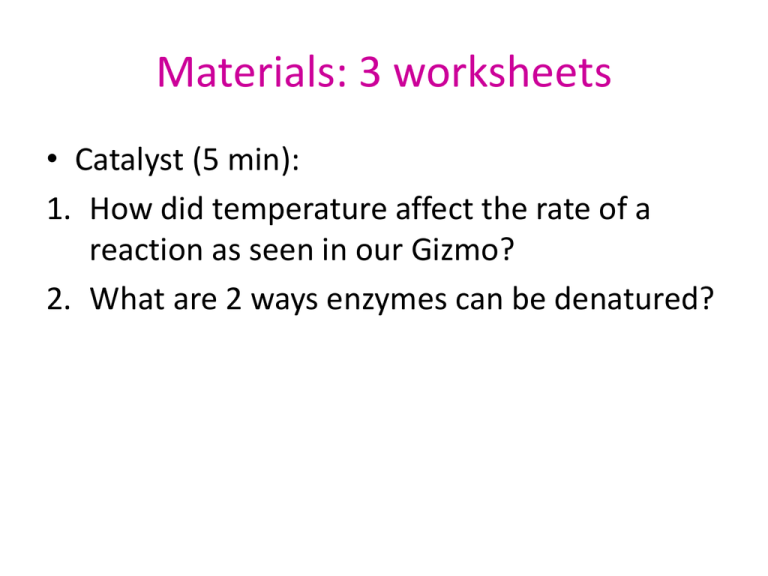
Materials: 3 worksheets • Catalyst (5 min): 1. How did temperature affect the rate of a reaction as seen in our Gizmo? 2. What are 2 ways enzymes can be denatured? Materials: 2 half sheets and paper from yesterday • Catalyst: Identify the enzyme, substrate, and products in the following sentence. A triglyceride is broken down into glycerol and fatty acids by lipase. Elite Eight Trait Check-Up 1. Respect the Threshold 1. Everyone on time? 2. Silent for First Five? 2. Be Prepared (2 min) 1. Seated 2. Have materials 3. Working on catalyst Unit 1 Class Point Challenge • • • • • • Period 1: Period 2: Period 4: Period 5: Period 6: Period 7: .77 .88 .90 1.28 Winners!!! .37 .76 Class Motto If there is a problem, We look for a solution. If there is a better way, We find it. If we need help, We ask. If a teammate needs help, We give. Announcements • We will be talking about Science and Engineering Expo Projects on Thursday/Friday. Come with research question (I have some of yours) • Enzymes Quiz Tomorrow • Enzymes project due – Thursday: Periods 1, 2, 4, 6 – Friday: Periods 5, 7 Standard • SB1b. Explain how enzymes function as catalysts. Recap • Catalysts speed up chemical reactions. • Enzymes are catalysts in living things. • Catalysts and enzymes work by lowering the activation energy necessary for a reaction to occur. EA is lowered by the enzyme How are enzymes denatured? • Denatured = Destroyed • Enzymes are denatured by high temperatures and low pH (acids) Collision Theory Gizmo • How did temperature affect the speed of molecules in the Gizmo? • How would this change the reaction? So how would adding a catalyst affect the reaction? • Would it affect the speed of the molecules? • Would it affect the speed of the reaction? Objectives • I can explain what it means for an enzyme to be specific, unchanged, and reusable. • I can recall the two ways enzymes are denatured. • I can identify the parts of an enzyme/substrate complex. • I can summarize the importance of enzymes in living organisms. Notes 2.3: Enzymes and Catalysts • This is a continuation from last week! You may write on the same notes paper. Enzymes Substrate: the material that an enzyme binds to Enzyme-Substrate Complex: enzyme and substrate together Active site: location where the substrate binds on the enzyme Enzymes • Enzymes often end in “ase” – Lactase (breaks down lactose) – Helicase (unzips DNA) – Amylase (breaks down amylose) – Lipase (breaks down lipids) Enzymes (Think – Pair – Share) • What’s a substrate? • What do enzymes usually end in? • Is lactase an enzyme or a substrate? How do you know? • What do you predict is the substrate for the enzyme sucrase? Characteristics of Enzymes • Enzymes are: –Specific –Unchanged in a reaction –Reusable Characteristics of Enzymes Enzymes are specific: • They only work with one reaction • The enzyme and the substrate fit together like a lock and a key Video • Think: How does this game show related to the characteristics of enzymes? Characteristics of Enzymes Or you might see it like this… • You will have to be ready to read a variety of different diagrams Enzymes (Think – Pair – Share) • What is an enzyme? • What does it mean to say that enzymes are specific? • What does it mean to say that enzymes are reusable? • Why are enzymes important? Enzymes What is structure X? What is structure Y? What is structure Z? Enzyme Disorders *LEL (Low Enzyme Levels) is America's & the world’s number one cause of sickness and death. *Inhibitors are molecules that decrease enzyme activity, and activators are molecules that increase activity. Drugs and poisons are often enzyme inhibitors. • • • • Cystic Fibrosis Gaucher's Disease Low Stomach Acid Inflammatory Bowel Disease/Syndrome • Intestinal Inflammation • • • • • • Ulcerative Colitis Ulcers Acne Gingivitis Sprue Pancreatic Insufficiency Classwork 2.3: Enzymes • You will have 15 minutes to work on this assignment. • Graded for accuracy! Enzymes Project Objective: Manipulate enzyme cut outs to represent a chemical reaction in our body. Directions: 2 people at each table start with part A and 2 people start cutting. Then switch! Panther Pass 1. What do enzymes do? 2. What does it mean to say that enzymes are “specific”? 3. What are the 2 ways enzymes are denatured? 4. Which of the following statements best describes enzymes? a) Enzymes cannot be reused after a reaction b) Enzymes are organic catalysts c) Enzymes slow down chemical reactions d) Enzymes can bind to any substrate
